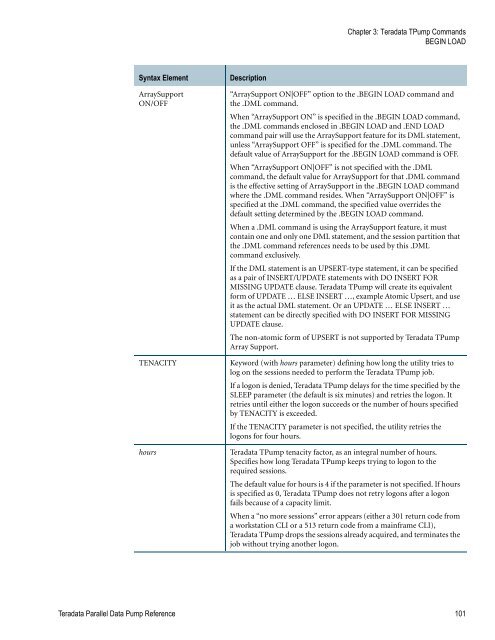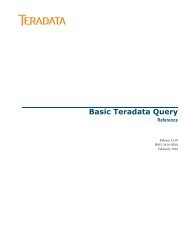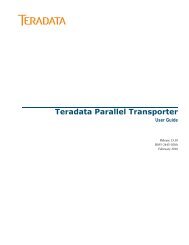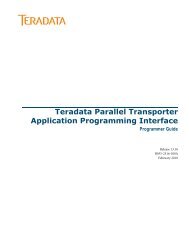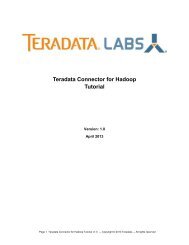Teradata Parallel Data Pump
Teradata Parallel Data Pump Reference - Teradata Developer ...
Teradata Parallel Data Pump Reference - Teradata Developer ...
- No tags were found...
You also want an ePaper? Increase the reach of your titles
YUMPU automatically turns print PDFs into web optimized ePapers that Google loves.
Chapter 3: <strong>Teradata</strong> T<strong>Pump</strong> Commands<br />
BEGIN LOAD<br />
Syntax Element<br />
ArraySupport<br />
ON/OFF<br />
TENACITY<br />
hours<br />
Description<br />
“ArraySupport ON|OFF” option to the .BEGIN LOAD command and<br />
the .DML command.<br />
When “ArraySupport ON” is specified in the .BEGIN LOAD command,<br />
the .DML commands enclosed in .BEGIN LOAD and .END LOAD<br />
command pair will use the ArraySupport feature for its DML statement,<br />
unless “ArraySupport OFF” is specified for the .DML command. The<br />
default value of ArraySupport for the .BEGIN LOAD command is OFF.<br />
When “ArraySupport ON|OFF” is not specified with the .DML<br />
command, the default value for ArraySupport for that .DML command<br />
is the effective setting of ArraySupport in the .BEGIN LOAD command<br />
where the .DML command resides. When “ArraySupport ON|OFF” is<br />
specified at the .DML command, the specified value overrides the<br />
default setting determined by the .BEGIN LOAD command.<br />
When a .DML command is using the ArraySupport feature, it must<br />
contain one and only one DML statement, and the session partition that<br />
the .DML command references needs to be used by this .DML<br />
command exclusively.<br />
If the DML statement is an UPSERT-type statement, it can be specified<br />
as a pair of INSERT/UPDATE statements with DO INSERT FOR<br />
MISSING UPDATE clause. <strong>Teradata</strong> T<strong>Pump</strong> will create its equivalent<br />
form of UPDATE … ELSE INSERT …, example Atomic Upsert, and use<br />
it as the actual DML statement. Or an UPDATE … ELSE INSERT …<br />
statement can be directly specified with DO INSERT FOR MISSING<br />
UPDATE clause.<br />
The non-atomic form of UPSERT is not supported by <strong>Teradata</strong> T<strong>Pump</strong><br />
Array Support.<br />
Keyword (with hours parameter) defining how long the utility tries to<br />
log on the sessions needed to perform the <strong>Teradata</strong> T<strong>Pump</strong> job.<br />
If a logon is denied, <strong>Teradata</strong> T<strong>Pump</strong> delays for the time specified by the<br />
SLEEP parameter (the default is six minutes) and retries the logon. It<br />
retries until either the logon succeeds or the number of hours specified<br />
by TENACITY is exceeded.<br />
If the TENACITY parameter is not specified, the utility retries the<br />
logons for four hours.<br />
<strong>Teradata</strong> T<strong>Pump</strong> tenacity factor, as an integral number of hours.<br />
Specifies how long <strong>Teradata</strong> T<strong>Pump</strong> keeps trying to logon to the<br />
required sessions.<br />
The default value for hours is 4 if the parameter is not specified. If hours<br />
is specified as 0, <strong>Teradata</strong> T<strong>Pump</strong> does not retry logons after a logon<br />
fails because of a capacity limit.<br />
When a “no more sessions” error appears (either a 301 return code from<br />
a workstation CLI or a 513 return code from a mainframe CLI),<br />
<strong>Teradata</strong> T<strong>Pump</strong> drops the sessions already acquired, and terminates the<br />
job without trying another logon.<br />
<strong>Teradata</strong> <strong>Parallel</strong> <strong>Data</strong> <strong>Pump</strong> Reference 101


